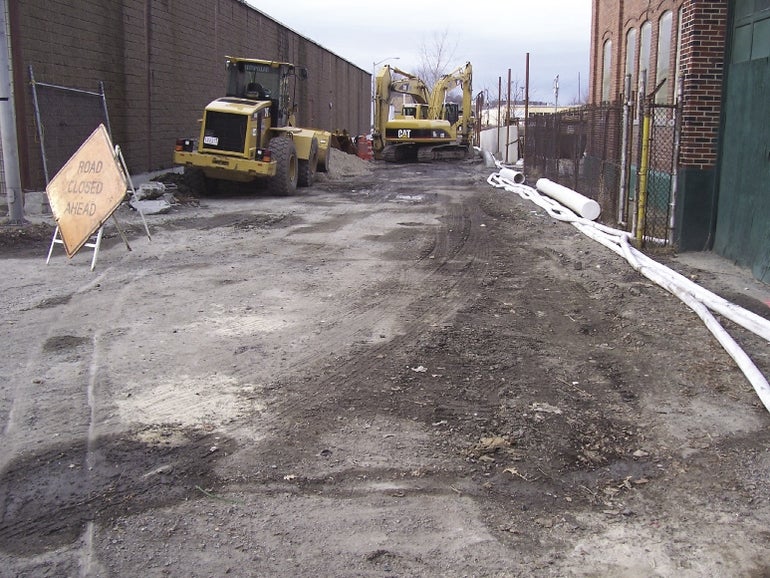Ernest Foster can tell you that owning a street isn’t easy. The West Boylston real estate broker owns buildings on both sides of Kansas Street in an old industrial corner of South Worcester. Because that section of the street isn’t classified as a public way, that means he owns the street itself.
“It’s not nice,” Foster said. “The burden is on me to maintain the street.”
Private roads are a longstanding headache in the city of Worcester and in other Central Massachusetts communities. While cities and towns plow snow from these streets and do enough emergency maintenance to ensure that emergency vehicles can get through, they’re not able to use state funds to repair and improve them. Many are in such bad shape that they’d require major intervention to meet city codes.Foster said the seriousness of the issue on Kansas Street became obvious about seven years ago, when state Department of Conservation and Recreation and the city Department of Public Works and had to do emergency work on the sewer system below the pavement. After digging up the street, Foster said, the city left it full of potholes rather than restoring it to its previous condition.
“If the city had owned the street, it would have assumed the responsibility of closing it up and restoring it to its prior position,” he said.
John Hill, a spokesman for the city of Worcester, said the DCR, not the city, was responsible for the project.
Foster said he continues to fill potholes and keep the street in drivable condition, but he doesn’t believe it should be his responsibilities.
“This street services many commercial properties that the city realizes the tax benefits from,” he said.
Substandard streets
Worcester’s private streets date from before 1925, when new regulations began requiring that streets be built up to certain standards, including having a foundation and appropriate drainage. Today, there are still about 81 miles of private streets in the city that were never up to city codes, said Paul J. Moosey, Worcester’s public works and parks commissioner.
“They’re the biggest source of complaints that we have at DPW in terms of dust and mud,” Moosey said.
Most of the private streets are residential, and they’re often dirt roads, he said. In some cases, property owners pitch in and pay for good maintenance, but some of the streets create big problems, particularly those on steep hills that may wash out during rainstorms and become unpassable in the winter. Runoff from private streets without proper drainage pollutes rivers and ponds.
The price of change
It is possible to convert the streets into public ways, but it’s not cheap. The city estimates the typical cost at $140 to $180 per foot. In most cases, property owners must agree to shoulder most of the expense, though the city pitches in by funding things like design and survey costs. Moosey said the city converts a bit less than a mile each year, budgeting $1 million to cover its costs.
Moosey said living on a private street can cause homeowners problems when they want to sell their properties.
“I’ve talked to several realtors over the years and even recently,” he said. “It’s much more difficult for them to find a buyer for a house on a private street.”
Worcester City Councilor George Russell, who chairs the Standing Committee on Public Works, said some owners are hesitant to pay for conversion. It can be expensive – easily running $15,000 for a single homeowner.
Russell said some people are also prefer their streets the way they are. In fact, he said, he once lived on a private dirt road himself, and he was happy that it forced traffic to slow down.
“My daughter was on a little tricycle,” he said. “That was a plus for us.”
At the start of the current legislative session last year, State Rep. Daniel Donahue (D-Worcester) introduced a bill that would allow state money to help pay for the conversion of private roads. He said other priorities have kept the matter in committee. He hopes it will do better in the future.
“It’s an issue that doesn’t just affect my district,” he said. “It’s an issue that affects quite a few communities.”
Other communities
Leominster has a number of private ways, though they’re not in the rough shape found in Worcester, said John Roseberry, senior engineering aide for the city DPW. Most date from the past 40 years, he said, created when developers built subdivisions and ran out of money before finishing things like catch basins and manholes.
Nearby, Fitchburg has around 45 miles of private streets, many of them built in the 1920s and ’30s, said Lenny Laakso, commissioner of public works.
“I can see why people complain, because they pay their property taxes like anybody else,” Laakso said.
Laakso knows about the issue from his personal life, because he has relatives who live on a private street.
“I won’t even go visit my cousin because my car would get destroyed going there,” he said. “I mean they have absolute craters.”

